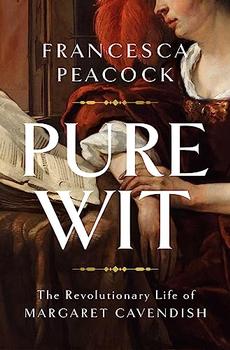Summary | Excerpt | Reviews | Beyond the Book | Readalikes | Genres & Themes | Author Bio

The Revolutionary Life of Margaret Cavendish
by Francesca Peacock
Margaret's visit proceeded in typically dramatic fashion. She wore a decadent dress, and was followed by her troupe of attendant ladies as crowds clamoured to see her. But for all the excitement, Pepys's assessment was damning: she was little more than "a good, comely woman" whose "dress so antick" made her little more than an amusing spectacle. She may have made it into the building of the Royal Society, but the men at its heart were all too quick to show her the door. After she had left – with an "elaborate curtsey", of course – the Society returned to their usual preoccupations: they made plans to measure the earth in St James's Park on Monday morning.
* * *
The men of the Royal Society and all the hangers-on who had stood by to watch her visit did not quite understand Margaret Cavendish. Pepys's assessment of her as a "good, comely woman" – with all the normality that that description implies – is laughably meaningless when applied to her life. This was a woman who lived at the forefront of the turbulence and disorder of the seventeenth century: who went into exile with Queen Henrietta Maria; who associated with Ben Jonson, Thomas Hobbes, and William Davenant; and who published poetry, fiction, prose, and philosophy at a time when an infinitesimally small number of women were writing at all, and an even smaller number dared to use their own name on their published works. She wrote about feminism, lesbianism, and cross-dressing – alongside discussions about the right form of government, the working of microscopes, and how atoms move. The life of Margaret Cavendish – born Margaret Lucas in 1623, to a wealthy but not aristocratic Royalist family – is anything but ordinary.
Why, then, have few people outside academia and dusty archives heard of her? In her own lifetime, she wouldn't have countenanced this as a possibility. She was remarkably confident about her aims: "All I desire is fame, and fame is nothing but a great noise, and noise lives most in a multitude, therefore I wish my book may set a-work every tongue." A bold statement – made bolder by the fact that it is found in the preface to her first printed work; the first non-anonymous published work of literature by an aristocratic woman since 1621, and one of a mere handful of signed works by women published in the first six decades of the seventeenth century. But, as Cavendish would later write in one of her plays, "fame is a double life, as infamy is a double death". Sadly, much of her later critical reputation has been shrouded in infamy.
In her ground-breaking feminist essay A Room of One's Own (1929), Virginia Woolf set Cavendish up for this second death. Woolf famously wrote the story of "Shakespeare's sister", Judith – a woman who was "as adventurous, as imaginative, as agog to see the world" as her brother, but was denied any of his chances and education because of the accident of her sex. Judith ends up dead: she "killed herself one winter's night" when the heartbreak of not being able to fulfil her talent and genius got too much for her. But not content with an imagined, frustrated female talent, Woolf turned her critical eye to the pages of literary history to find the female writers who were also "born with a great gift" and, as a result of being unable to use it, found themselves "crazed", dead, or spending their days "in some lonely cottage outside the village, half witch, half wizard, feared and mocked at".
Woolf kindly dismissed the poet Anne Finch, Countess of Winchelsea – "her gift is all grown about with weeds and bound with briars" – and lauded the Restoration playwright Aphra Behn ("for here begins the freedom of the mind"; she showed women they could "make money by [their] pen[s]") before she lit upon "hare-brained, fantastical" Margaret Cavendish. Some of Woolf's comments on Cavendish are so damning they are almost the platonic ideal of insults: she is "crack-brained and bird-witted"; a "giant cucumber" in a rose garden who chokes the other plants; and she "frittered her time away scribbling nonsense and plunging ever deeper into obscurity". Few readers in the twentieth century could, in good conscience, pick up a Cavendish volume after reading such excoriating words. And, in Woolf's view, nobody did: her books "moulder in the gloom of public libraries".
Excerpted from Pure Wit by Francesca Peacock. Copyright © 2024 by Francesca Peacock. Excerpted by permission of Pegasus Books. All rights reserved. No part of this excerpt may be reproduced or reprinted without permission in writing from the publisher.
The single biggest problem in communication is the illusion that it has taken place
Click Here to find out who said this, as well as discovering other famous literary quotes!
Your guide toexceptional books
BookBrowse seeks out and recommends the best in contemporary fiction and nonfiction—books that not only engage and entertain but also deepen our understanding of ourselves and the world around us.